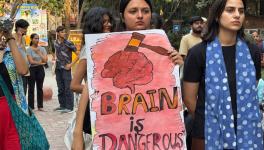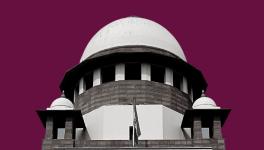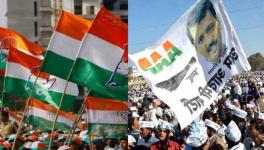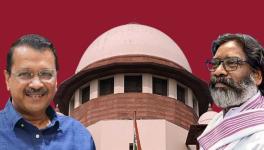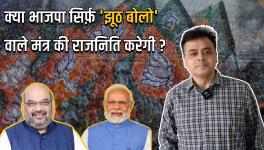DU: Employees Forced to Delay Treatment as Salaries Not Paid for Months in Delhi Government Funded Colleges

Delhi: For Hari Singh, it seems like a never-ending struggle to find the money for the treatment of his oral cancer, as he makes calls to people for help. After an unsuccessful surgery, oncologists have now suggested another procedure to put jaws in place. Singh, an employee of Maharaja Agrasen College of Delhi University, never thought of going through a financial predicament with a secured government job in hand and a regular stream of salary. However, he has not received any salary for a long time after the funding from the Delhi government stopped owing to a slew of issues.
The employees of twelve Delhi University colleges fully funded by the Delhi government maintain that they are waiting for their full salaries for the previous four months with abrupt stopping derailing common lives completely.
Talking to Newsclick over the phone, Singh said that he has arranged money for treatment on exorbitant interest rates. “I have started borrowing money on heavy interest as high as 5% per month. I need money for tests and medicines desperately. No salary means I am literally unemployed. The friends and well-wishers could help in their limited capacity. Now, I have no options but to bear this pain with helplessness.”
The employees of the college told Newsclick that the crisis had its roots in the slugfest between the Delhi government led by the Aam Aadmi Party and the colleges when the former demanded the formation of governing bodies, the highest decision making authorities in the colleges run under the Delhi University Act,1922. The Delhi government had alleged that the principals were appointing teachers arbitrarily without its permission even though it remained the primary funding agency.
The current point of contention between the two remains the usage of student society funds collected from students over twenty-seven years, with the Delhi government pressing for paying the salaries through the said fund. However, the move has been vehemently opposed by the colleges.
Delhi government funds 28 colleges in all – 12 fully and 16 colleges partially. The 12 colleges are Indira Gandhi Institute of Physical Education & Sports Science, Shaheed Sukhdev College of Business Studies, Shaheed Raj Guru College, Deen Dayal Upadhyaya College, Dr Bhim Rao Ambedkar College, Acharya Narendra Dev College, Bhagini Nivedita College, Keshav Maha Vidyalaya, Maharaja Agrasen College, Aditi Mahavidyalaya, Maharishi Balmiki College of Education, and Bhaskara Charya College of Applied Sciences.
Sixteen colleges, that are partially funded by the Delhi government, are Shivaji College, Motilal Nehru College, Laxmi Bai College, Shaheed Bhagat Singh College, Maiteryi College, SPM College for Women, Satyawati College, Vivekanand College, Rajdhani College, Kamla Nehru College, Gargi College, Swami Shardhanand College, Kalindi College, Bharti College, Sri Aurbindo College and Delhi College of Arts and Commerce.
Bhupinder Chaudhary, a teacher at Maharaja Agrasen College told Newsclick that using the student society funds for paying the salaries will have consequences.
“Ideally the colleges should have used the fund for building the infrastructure and other facilities for assisting the students. But they started earning interest on it by turning them into fixed deposits. Paying the salaries through this fund means agreeing to the privatisation agenda, that the students should bear the costs of their education.”
Chaudhary added that “Now, the Delhi government is arguing that the colleges had to mobilise the fund on their own and it will provide the deficit money for running the colleges as per the memorandum of understanding signed between them and the Delhi University. Whatever the case may be but it should not have stopped the funding abruptly. The crisis has deepened to the extent that the hospitals on the university panel are straight away denying to offer cashless treatment. The patient will have to bear the cost and get it reimbursed. The colleges are not in a position to reimburse as they have no funds.”
Rajesh Kumar Jha, a former member of DU’s executive council and a teacher at Rajdhani College told Newsclick that the Lt Governor Anil Baijal also needs to answer some questions. He said the abrupt stoppage has brought administrative activities to a halt, affecting every stakeholder. He added, “when you stop funding, everything gets stopped. The students cannot get their scholarships. The elderly depend heavily on pensions. The employees undergoing treatment too remain in the lurch. Banks are threatening them over non-payment of EMIs. When we say Delhi government should fix the issue forever, it effectively includes the office of Lt Governor also. After the Supreme Court Judgement, Anil Baijal has far-reaching powers for administering the national capital. The office-bearers of the Delhi University Teachers’ Association (DUTA) had made their representation to the LG office about the crisis. He should also come out and clear his position about the plight of the teachers. He has much more work to do than putting files in cold storage.”
Rani Mishra who has been teaching Hindi literature in another Delhi government-funded Bhagini Nivedita College for three decades said that the tussle never happened in previous decades even when the centre and the national capital were ruled by two different parties. Sahib Singh Verma was the Chief Minister and PV Narsimha Rao was the Prime Minister but the colleges never faced such distressing times. “If the Delhi government thinks it can run the colleges just like schools under control, it cannot happen. It is governed by Delhi University Act and we have our own statutes and provisions to follow. I may be in a comfortable position but what about guards, gardeners and sweepers who are already being paid less than minimum wages. How are they going to cope if you stop salaries for months.”
Vipin Negi, Associate Professor at Keshav Mahavidyalaya told Newsclick that the ensuing crisis has compelled young teachers to have second thoughts about continuing their services in the Delhi University, as at least two teachers from the college moved to a private university recently. He said the crisis is also taking a toll on the teaching-learning process too.
“Certainly, it is affecting studies. The teachers are mentally perturbed. In my case, I got an offer from Himachal State University to join but I declined it because we face too much external interference there. Delhi University was considered the best choice for people who wanted to dedicate themselves to academics. We are still teaching, organising webinars only to ensure the students do not suffer. But the crisis has changed the definition of this central university for us as vulnerabilities are not ending.”
Newsclick did not receive the replies from Atishi, a member of the Court of Delhi University and Advisor to Delhi Education Minister Manish Sisodia over the issue.
Get the latest reports & analysis with people's perspective on Protests, movements & deep analytical videos, discussions of the current affairs in your Telegram app. Subscribe to NewsClick's Telegram channel & get Real-Time updates on stories, as they get published on our website.









